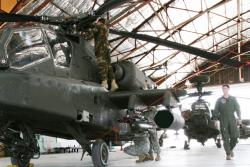
This Atlantic Council report examines the geopolitical context that will likely frame the security environment of the next 20 to 40 years and identifies the implications of U.S. bases in foreign countries. We organized a group of former senior military leaders, diplomats, business leaders, and other experts, with the goal of pooling their wisdom and providing insights into planning for future military installations overseas.
Download the PDF
The examination of America’s basing, force structure and forward engagement strategies is a never-ending process. These studies have been particularly vigorous since the end of the Cold War and there is no sign the situation will become less urgent in the future.
Conclusions and Recommendations:
Bases in a Strategy of Combined Power
To maintain U. S. security in an increasingly globalized world will require the effective use of all elements of national power. Bases can be important for military reasons, but, if properly utilized, they have significant diplomatic value as well and can support U. S. informational and even economic goals. Given the unpredictability of future challenges and difficulties the United States will face, maintaining a flexible base network will be extremely valuable to overall U. S. national security strategy.
Building Trust and Promoting Common Interests
In order to maintain access to existing bases and gain options for new bases, the United States will need to commit substantial resources to promoting common interests and building trust with existing and new partners. We cannot assume that “if we need it, we can get it” in terms of future operating bases. Common interests develop from common understandings and a willingness to act in concert on common problems. Developing the ability to act together requires a wide range of formal and informal efforts that include regular information exchanges and consultation before action is taken that will affect a partner’s interests. Countries will act in their interests but how they see those interests is subject to development over time. Interpersonal relationships can be important in shaping those perceptions, and particular attention should be devoted to the next generation of political and military leaders who may have more anti-U.S. sentiments or simply less of a connection with the United States than do their elders.
Multi-Dimensional Bases
Given that all elements of national power will be necessary to advance U.S. interests, bases abroad should be evaluated to determine whether there are benefits to supporting multidimensional goals through the bases. As the concept of security becomes more broadly defined, U.S. capabilities must adapt to this changing environment and bases should be an important part of this adaptation. While bases will primarily have a military function, some overseas bases could increasingly support a more diverse and better integrated set of capabilities. For example, they could be a center for joint interagency planning at the strategic and operational levels including the implementation of stabilization and reconstruction efforts and for humanitarian and disaster relief. Such a transformation in bases could be part of an overall effort to improve the political-military interface. Whereas great strides have been made in achieving better integrated military operations among the armed services, progress has been much slower in coordinating essential political-military operations. Diplomatically, the use of bases to support regional activities may be important elements in the war on terror or in dealing with weapons of mass destruction—or even in maintaining general regional stability. Multinational bases may be important in supporting the goals of the host and regional countries—and may be the best way to advance U.S. interests. As an example, the disastrous Indian Ocean tsunami of December 26, 2004 and its aftermath may present new opportunities for the United States to explore multi-purpose bases with countries in the region.
Comprehensive Assessments
There are many important benefits to be derived from bases in the future, but the current approach to thinking about and managing overseas bases is suboptimal in several regards. First, the overseas basing network is not subject to a systematic evaluation and review process. Periodic assessments of the overall base network would be useful inputs to management of better overseas bases. These assessments could drive a global base network evaluation and review process. Taking into account the importance of all elements of national power, the assessments could include interagency considerations and views of U.S. ambassadors in regional states and could look at the base network from many perspectives, including how the base network could be improved to become more cost efficient and provide U.S. forces with more flexibility and agility, as well as how broader U. S. national security goals could be achieved. Comprehensive base network assessments also should examine how the bases are viewed from foreign perspectives and the impact of such views—and how to enhance the value of the bases to the host country and the region. Such an effort could build on the global force posture review undertaken by the Secretary of Defense over the last few years and could become part of the Quadrennial Defense Review process. A second suboptimal element of base management is that base costs are paid out of the budget of a single service while a particular base generally provides benefits that extend far beyond the requirements for the particular service paying the bill. Accordingly, the DoD should look at a budget process that takes account of the overall benefits from bases.
Image: MilitaryBase.warsawbiopic.jpg
